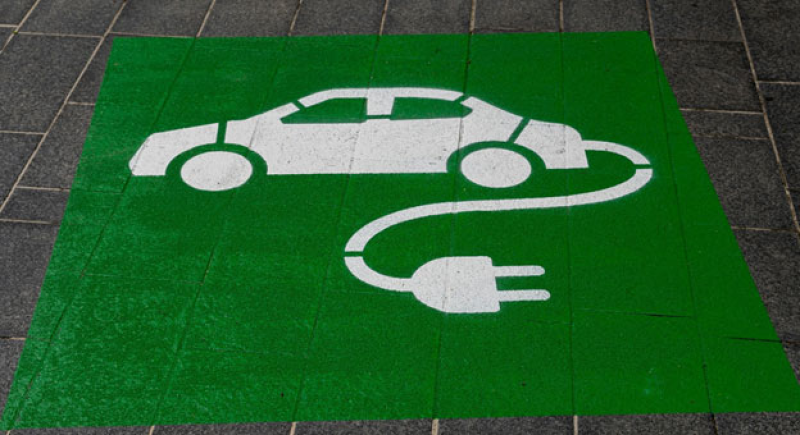- India Sees 9% Drop in Foreign Tourists as Bangladesh Visits Plunge |
- Dhaka Urges Restraint in Pakistan-Afghan War |
- Guterres Urges Action on Safe Migration Pact |
- OpenAI Raises $110B in Amazon-Led Funding |
- Puppet show enchants Children as Boi Mela comes alive on day 2 |
Asia-Pacific Advances Circular EV Battery Waste Solutions

An EV charging sign on the street. The growing demand for EVs requires a comprehensive framework to handle environmental impacts from used EV batteries.
The Asia-Pacific region is emerging as a leader in regional solutions for managing electric vehicle (EV) battery waste. As EVs rapidly gain popularity, the region faces a dual challenge: addressing the environmental and health risks of end-of-life EV batteries while seizing the economic and technological opportunities of a circular economy.
By strategically combining public policy with private sector innovation—especially among micro, small, and medium-sized enterprises (MSMEs)—the region can turn this challenge into a blueprint for inclusive and sustainable economic growth.
The transition to EVs is not only about cleaner transportation and energy options; it represents a fundamental shift in how resources are used, recovered, and repurposed. The circular economy, based on the five “R” principles (Reduce, Reuse, Recycle, Repurpose, Recover), offers a strategic framework to maximise battery material value, minimise waste, and break the link between economic growth and environmental harm. These principles are essential for sustainable battery waste management.
However, achieving this vision requires more than technology; it depends on developing a skilled workforce and innovative business models. Education and capacity-building are key drivers. Without understanding local contexts and practical circularity, a sustainable ecosystem by 2030 will remain out of reach.
In 2025, the Jaipur Declaration on 3R and Circular Economy provided important ideas and solutions for transitioning to circularity in end-of-life batteries and vehicles.
Managing EV battery waste requires collaboration; no single country can solve it alone. Governments play a critical role by establishing regulatory frameworks such as Extended Producer Responsibility (EPR) schemes, mandatory recycling targets, and eco-design standards.
These policies must align with international climate agreements, including those adopted at COP29 in Azerbaijan in 2024, which highlight emissions reduction goals and the importance of circular economy principles to achieve net-zero.
By codifying these requirements into law and ensuring transparent reporting and monitoring, governments can make sure local efforts support broader climate and sustainability objectives.
A successful circular economy for EV batteries depends on integrating circularity principles, innovative finance, and multi-stakeholder dialogue. This requires engagement among governments, private sector, MSMEs, civil society, and academia.
Circularity means rethinking the entire value chain. National and regional cooperation is vital for sharing best practices, harmonising standards, and coordinating cross-border flows of recyclable materials.
These platforms also help scale advanced recycling infrastructure, promote eco-design, and embed circular economy principles at every stage, from product design to end-of-life management.
Financial innovation is equally important, requiring digital technologies and policies to unlock widespread investment in public goods and infrastructure. Governments, often in partnership with regional and international development agencies, can provide grants, concessional loans, and guarantees to reduce barriers for MSMEs and startups in battery recycling and repurposing.
Combined with technical training and capacity-building, these efforts empower local businesses to innovate, create green jobs, and strengthen regional supply chains.
The ESCAP Sustainable Business Network (ESBN) highlights education’s crucial role in bridging policy and practice. Public awareness campaigns promote responsible EV battery disposal and inform communities about the dangers of informal handling.
Targeted training for MSMEs, technicians, and recyclers develops the skills necessary to safely process battery waste in line with international standards. The recent Fourth International Conference on Financing for Development stressed the need for incentives supporting MSMEs in this sector.
The Asia-Pacific region has a transformational opportunity to enhance knowledge-sharing and capacity-building in circular economy innovation. ESCAP stands ready to support this shift.
This effort is not just about waste management; it reimagines circular economy value by fostering green jobs, strengthening education, and encouraging innovation that benefits both people and the planet.
Seamlessly integrating national policies with regional and global commitments, deploying smart financing tools, digital technology, and fostering public-private partnerships will allow the Asia-Pacific to transform EV battery waste from an environmental challenge into a powerful engine for inclusive growth, new employment opportunities, and climate resilience.
Anupam Khajuria is Research Fellow and Academic Associate at the United Nations University Institute for the Advanced Study of Sustainability (UNU-IAS), Tokyo, Japan. Sudip Ranjan Basu is Chief of Sustainable Business Network Section, ESCAP, Bangkok.

